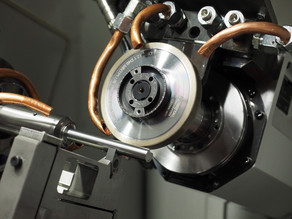Entwicklung eines simulativen Modells zur Einflussanalyse des Kühlschmierstoffes beim Wendeltiefbohren mit kleinen Durchmessern unter Berücksichtigung der Spanbildung zur Optimierung der Werkzeug- und Prozessgestaltung für die Bearbeitung von Ti-6Al-4V
Deep hole drilling is becoming increasingly important in the production of small diameter bore holes and it is used in various branches of industry. The methods particularly applied for deep hole drilling are single-lip deep hole drilling and deep hole drilling with twist drills, with the latter being able to achieve greater feed rates and higher productivity due to the geometrical characteristics of the tool. Especially for the machining of difficult-to-machine materials an efficient supply of the cutting tool with cooling lubricant reduces wear and increases tool life. This also improves process reliability by ensuring a continuous chip removal. The empirical determination of the mechanical and thermal loads for the analysis and optimisation of deep hole drilling processes usually requires dedicated measuring technology and generates a high effort for the experimental setup. The aim of this project therefore is the development of a suitable numerical model to simulate the process, which allows to analyse the influence of the cooling lubricant in deep hole drilling with small diameter twist drills.
To integrate the cooling lubricant supply, the existing thermal Finite Element Method (FEM) simulations are confined to the assumption of constant and uniform convection conditions. The dependencies of the local convection on the flow velocity, on turbulences in the flow and on the temperature gradient between the coolant and the tool or the workpiece surface are not considered. In conventional computational fluid dynamics (CFD) simulations, changes of the workpiece-tool model during the chip formation are not taken into account for the prediction of the coolant flow in the contact zone (fig.). The coupling of the two simulation methods within the fluid-structure interaction (FSI) allows a more accurate calculation of the resulting temperature fields and the thermal loads of the tool and the workpiece depending on the coolant pressure. With the developed model, the tool design can be optimised with regard to the coolant flow at the cooling channel outlets. Furthermore, it is possible to calculate the necessary coolant pressure aiming at an energy effective process cooling.
The data basis for development and verification of the simulation model is provided by experimental investigations on a micro deep hole drilling machine. The tool diameter of the twist drills used for the deep hole drilling process are d = 3 mm and d = 5 mm and they are still associated with the micro-range. For workpiece material the titanium alloy TiAl6V4 (material number: 3.7165) is used. The resulting mechanical and thermal loads can be recorded by means of piezoelectric sensors and thermocouples. Using a high-speed camera and special experimental setups, the chip formation and the coolant flow can be observed and analysed under real process conditions.




![[Translate to English:] [Translate to English:]](/storages/isf-mb/_processed_/a/1/csm_Wendel_Tiefbohrer_51a08eea1c.jpg)